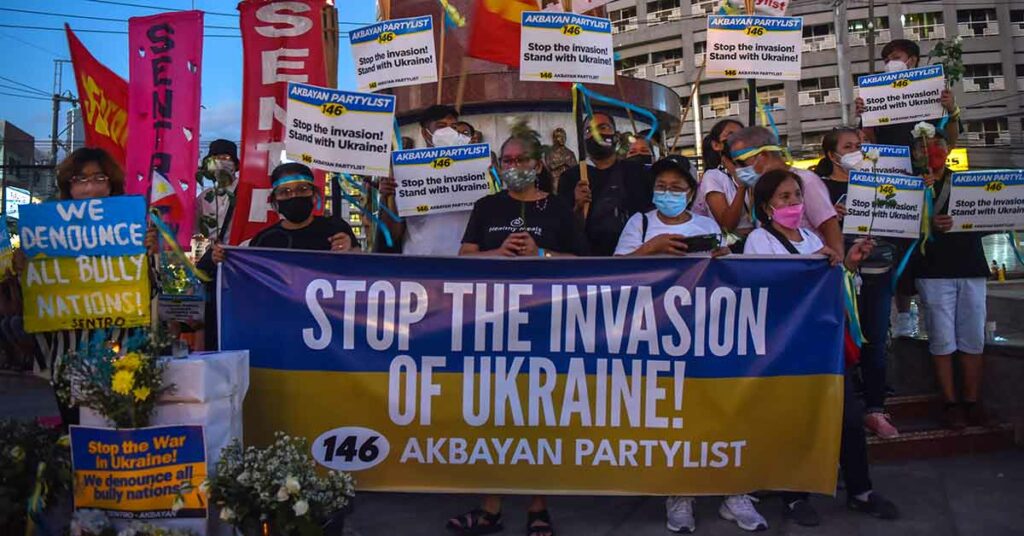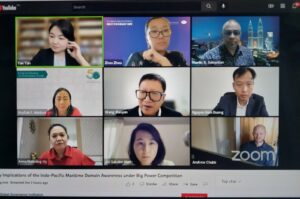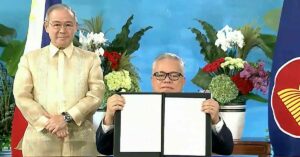
Just this Thursday (10 March, 2022), the Philippine Ambassador to the United States (US), Ambassador Jose Manuel Romualdez, in an online forum, told journalists that Philippine President Duterte is willing to open facilities to the US if the Ukraine-Russia crisis spills over to Asia.
Romualdez further said that the Philippines has a Mutual Defense Treaty (MDT) with the US, which binds the two allies to come to each other’s aid from aggression and help defend the other party.
“And our choice is obvious, and since we have an MDT with the United States, we have this special relationship and military alliance, Romualdez added.
Moreover, at the inauguration of the Narvacan Farmer’s Market in Ilocos Sur on Friday (4 March, 2022), in a speech, it was no less than President Duterte himself who mentioned that Romualdez gave him the invitation letter from US President Joe Biden for the ASEAN leaders’ summit in Washington on 28 March. The summit is part of the US efforts to step up engagement with ASEAN member states to contain China’s growing political and economic influence in the region.
Duterte said, “I must be frank with you. Noong nagpunta ‘yung ambassador natin si Romualdez sa akin, dala-dala niya ‘yung sulat ni Biden, kaming mga ASEAN leaders about nine of us, papuntahin ngayong March 28 sa Washington para mag-usap-usap lang (When our ambassador Romualdez came to me yesterday or the other day, he delivered to me Biden’s letter which invited us ASEAN leaders about nine of us to go to Washington on 28 March 28 to talk).”
Duterte also said in the same speech that he does not want any foreign soldiers and police officers, including Americans, roaming around the country. The tough-talking Philippine President also expressed that he does not like the “arrogance of the Americans.”
“The Americans ayaw ko. Ayaw kong may sundalo na foreigner, be it an Arab, European, ASEAN soldiers or bearing arms. Ayaw ko sila sa bayan ko kasi magulo, pati ayaw ko lang (The Americans, I don’t like them. I don’t want foreign soldiers be it Arab, European, ASEAN soldiers, or bearing arms. I don’t want them in the country because it will be chaotic, and I just don’t want them),” Duterte said.
“I just want Filipino policemen and Filipino soldiers roaming around in the country na nagdadala ng baril, armas, lahat na (bringing guns, arms, and everything else),” he added.
Furthermore, in the same speech in Narvacan, Ilocos Sur, the Philippine President reiterated that the Philippines is neutral on the issue but said that someday, the country would have to choose sides.
Nevertheless, the Philippines voted in favour of a US-backed United Nations (UN) resolution condemning Russia’s military intervention in Ukraine.
In the emergency session of the UN’s general assembly, 141 of the 193 member states voted in favour of the resolution, 35 abstained, five voted against, and 12 did not vote at all.
The five countries, including Russia that voted against the UN resolution, were Belarus, North Korea, Eritrea, and Syria.
Longstanding allies of Russia, like Cuba, Nicaragua, India, China, Pakistan, Iraq, and Iran, abstained in the same manner that countries like South Africa, Lao, Mongolia, and Vietnam also abstained.
Hindsight And Perspective
Once again, the Philippine Ambassador to the US, Jose Manuel Romualdez, speaks on behalf of the President. Unless it’s from the President himself, I will take Romualdez’s statement with a grain of salt.
On another note, it’s just astonishingly irksome what the “amboys” (American boys) in the Philippines have been insinuating for some time now. To open the country’s military facilities to the US for whatever reason, even let us say if the Ukraine-Russia crisis spills over to Asia, which I have doubts it will unless the US provokes China in the Taiwan Straits, is no doubt a dangerous game that the Philippines and its leaders must contemplate seriously.
Any persuasion to open the country’s military facilities to the US would practically make the Philippines a US strategic security and defense outpost and the launchpad for its security and military operations in the Indo-Pacific region.
This could drag the Philippines into the fray as a pawn, serving US military interests. Is this what Filipinos want for their country? Has the Philippines not learned from the lessons in its history?
The Philippines was invaded by Japan not because it was at war with Japan. The country was invaded by Japan precisely because it was home to the largest US military installation outside America. As a nation, Filipinos should learn from their experience during World War 2.
The Philippines was not at war with Japan; it became a battleground for the war between Japan and the US, and one critical factor to that was the massive presence of US forces and military assets in the country in the same manner that Ukraine is the battleground for the Russia – US-led NATO war.
Suppose one closely observes the situation in the ongoing tug of war between the US and Russia over Ukraine without discounting NATO’s role but considering that NATO, more often than not, follows the lead of the US. In that case, Ukraine is a pawn in the geopolitical manoeuvres of the US because of its strategic geographical location in the same manner that the Philippines will most likely be a pawn of the US to reassert its hegemonic status in the Indo-Pacific region, which is now under threat by the rise of China as a rival power.
If the Philippines and its leaders are not careful, the country might end up as a pawn or proxy in the US chase of containing Russia in the Eastern part of Europe and China in the Indo-Pacific region. This scenario will be most precarious for the Philippines.
After the expiration in 1991 of the MDT or Mutual Defense Treaty Agreement between the Philippines and the US concerning military bases, foreign military bases, troops, or facilities shall not be allowed in the Philippines except under a treaty duly concurred in by the Senate and, when the Congress so requires, ratified by a majority of the votes cast by the people in a national referendum held for that purpose, and recognized as a treaty by the other contracting State.”
The 1987 Constitution of the Republic of the Philippines, ratified in a nationwide plebiscite on 8 February, 1987, effectively put an end to all military cooperation via American military presence in the Philippines under the RP-US Mutual Defense Treaty of 1951.
From a constitutional standpoint alone, the MDT should have been rescinded as early as the Cory Aquino administration in the same manner that the Enhanced Defense Cooperation Agreement (EDCA) should have been ratified by the Senate or abrogated because it also violated the constitution in many respects.
Thus, it begs to ask if the next President will have the courage to review, revisit or even scrap the MDT, EDCA, and visiting forces agreement (VFA) and stand up to America.
On another note, it’s but naïve to say that the Russian military operation in the Ukraine is unprovoked.
After the collapse of the Soviet Union, there were five waves of NATO enlargement, which included its expansion eastward of Europe, taking into its fold eastern European countries that were once members of the Soviet bloc like the Baltic states of Lithuania, Latvia, Estonia, Poland, and Romania.
This despite the fact that a document dated March 1991 stipulated that the US, the United Kingdom (UK), French and German officials indeed discussed a pledge made to Moscow that NATO would not expand to Poland and beyond.
The document also contained multiple references to the 2+4 talks on German unification. Western officials made it clear to Moscow that NATO would not expand into territory east of Germany. The US-led West promised Moscow that NATO would not expand to the Eastern part of Europe, but it has failed to honour such a pledge.
Since 2008, NATO has been playing with the idea of signing-up Ukraine, which to a greater extent triggered the alarm button in Russia.
If one looks at the map of Europe, NATO’s expansion moving eastward has brought it one step closer to Russia or just 100 miles closer to Moscow; not only bordering Russia but to a greater extent encircling Russia. These geopolitical realities, by and large, triggered the current military standoff over Ukraine between the US-led NATO and Russia.
Conclusion
The Philippines should avoid the fate of Ukraine. The country should prevent at all costs the possibility of becoming a pawn of any superpower in their proxy wars. It must avoid being used as a pawn by any superpower to encircle another superpower.
The best way forward is for the Philippines to stay neutral in the ongoing Ukraine-Russia crisis. The Philippines should avoid being on the frontline of any military confrontation and competition consequential to the power struggle of the superpowers, which is not to the advantage and not in line with the country’s core national interests.
At the same time, the Philippines should advocate and call for Russia and Ukraine to go back to the negotiating table, de-escalate conflict, and strive for a political settlement agreeable to both parties without external interference.
Furthermore, it is high time that the Philippines takes hold of its fate and destiny as a country rather than relying on others for its development, progress, and even security/survival amid the geopolitical tensions affecting the Indo-Pacific region and the world at large.
Source: The ASEAN Post
https://theaseanpost.com/opinion/2022/mar/13/philippines-neutrality-ukraine-crisis



